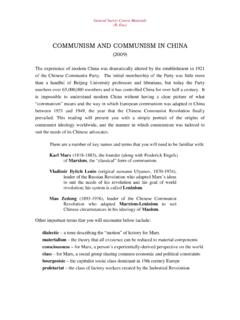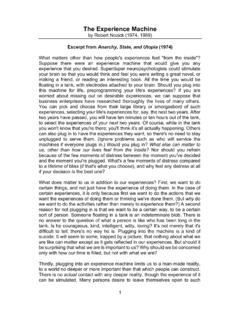Transcription of PLATO’S “EUTHYPHRO” - IU
1 Early Chinese thought Course Readings (R. Eno) PLATO S EUTHYPHRO This version of the Euthyphro is, of course, not my translation. It was composed in 1986 by comparing and modifying for readability a number of published translations, whose authors should be credited. However, the record of which translations were used was long ago lost. When teaching courses in early Chinese thought , I used the Euthyphro to create a vastly oversimplified, but very useful portrait of salient features of the analytic approach that Greek thought made foundational to what I called the mainstream Western tradition.
2 I contrasted this with styles of thought in early China (in the case of Mohism, there were more parallels than contrasts) to highlight aspects that may seem, from the standpoint of analytic Western traditions, relatively unfamiliar, at least in their emphasis. The way this worked in a classroom setting may be discernable through the PowerPoint slides that I used in later years. I. Socrates and Euthyphro meet at the Porch of King Archon EUTH. What has happened, Socrates, to make you leave your accustomed pastimes in the Lyceum and spend your time here today at the King s Porch?
3 You can hardly have a suit pending before the King, as I do. SOC. In Athens, Euthyphro, it is not called a suit, but an indictment. EUTH. Really? Someone must have indicted you. For I will not suspect you of indicting someone else. SOC. Certainly not. EUTH. But someone you? SOC. Yes. EUTH. Who is he? SOC. I do not know the man well, Euthyphro. It appears he is young and not prominent. His name, I think, is Meletus. He belongs to the deme of Pitthus, if you recall a Pitthean Meletus with lanky hair and not much beard, but a hooked nose.
4 EUTH. I have not noticed him, Socrates. But what is the charge? SOC. Charge? One that does him credit, I think. It is no small thing for him, young as he is, to be knowledgeable in so great a matter, for he says he knows how the youth are being corrupted and who is corrupting them. No doubt he is 2 wise, and realizing that, in my ignorance, I corrupt his comrades, he comes to the City as to a mother to accuse me. He alone seems to me to have begun his political career correctly, for the right way to begin is to look after the young men of the City first so that they will be as good as possible, just as a good farmer naturally looks after his young plants first and the rest later.
5 So too with Meletus. He will perhaps first weed out those of us who blight the young shoots, as he claims, and afterwards he will obviously look after their elders and become responsible for many great blessings to the City, the natural result of so fine a beginning. EUTH. I would hope so, Socrates, but I fear lest the opposite may happen. He seems to me to have started by injuring the City at its very hearth in undertaking to wrong you. But tell me, what does he say you do to corrupt the youth? SOC. It sounds a bit strange at first hearing, my friend.
6 He says I am a maker of gods, and because I make new ones and do not worship the old ones, he indicted me on their accounts, he says. EUTH. I see, Socrates. It is because you say the divine sign comes to you from time to time. So he indicts you for making innovations in religious matters and hales you into court to slander you, knowing full well how easily such things are misrepresented to the multitude. Why I, even me, when I speak about religious matters in the Assembly and foretell the future, why, they laugh at me as though I were mad.
7 And yet nothing I ever predicted has failed to come true. Still, they are jealous of people like us. We must not worry about them, but face them boldly. SOC. My dear Euthyphro, being laughed at is perhaps a thing of little moment. The Athenians, it seems to me, do not much mind if they think a man is clever as long as they do not suspect him of teaching his cleverness to others. But if they think he makes others like himself they become angry, whether out of jealousy as you suggest, or for some other reason.
8 EUTH. On that point I am not very anxious to test their attitude toward me. SOC. Perhaps they think you give yourself sparingly, that you are unwilling to teach your wisdom. But I fear my own generosity is such that they think I am willing to pour myself out in speech to any man--not only without pay, but glad to pay myself if only someone will listen. So as I just said, if they laugh at me as you say they do at you, it would not be unpleasant to pass the time in court laughing and joking.
9 But if they are in earnest, how it will then turn out is unclear--except to you prophets. 3 EUTH. Perhaps it will not amount to much, Socrates: Perhaps you will settle your case satisfactorily, as I think I will mine. SOC. What about that, Euthyphro? Are you plaintiff or defendant? EUTH. Plaintiff. SOC. Against whom? EUTH. Someone I am again thought mad to prosecute. SOC. Really? Has he taken flight? EUTH. He is far from flying. As a matter of fact, he is well along in years. SOC. Who is he?
10 EUTH. My father. SOC. Your father, dear friend? EUTH. Yes, indeed. SOC. But what is the charge? What is the reason for the suit? EUTH. Murder, Socrates. SOC. Heracles! Surely, Euthyphro, the majority of people must be ignorant of what is right. Not just anyone would undertake a thing like that. It must require someone quite far gone in wisdom. EUTH. Very far indeed, Socrates. SOC. Was the man your father killed a relative? But, of course, he must have been-you would not be prosecuting him for murder in behalf of a stranger.







